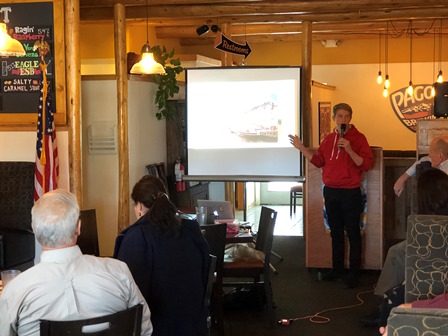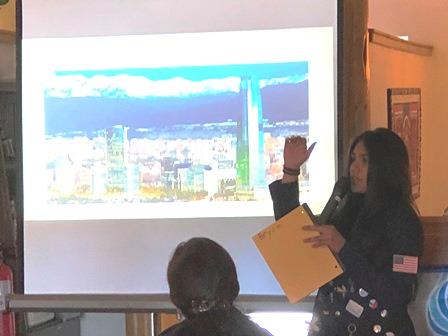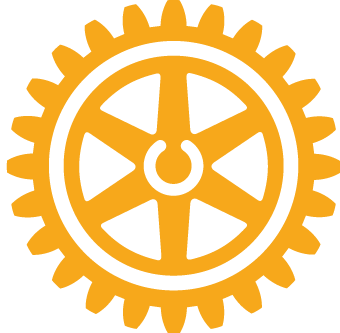
Theodor led off with a discussion of Denmark, a land one-sixth the size of Colorado, having a maximum land altitude of 563 ft., 443 islands, 6000 power-generating windmills, Viking heritage, free health-care and education, and even salaries for students to attend college. (Imagine: young people don’t need to start life staring at a mountain of debt!)
His father is a farmer, with a big house (the whole Rotary club could stay there, Betty exclaimed), and 1000 acres producing wheat, barley, rye and supporting 2000 pigs – pork is a Danish staple, Theo explained. Of course, he acknowledged a national fondness for pastry too (“Danish, you know.”)
Denmark is known for Lego, Maresk shipping containers, Carlsberg Beer, and Hans Christian Andersen, Theo reported, while displaying photos of all, Andersen being represented by the Littlest Mermaid statute in Copenhagen Harbor. The city of Copenhagen is ancient, with many buildings of great antiquity. Denmark has a King, the current leader of a Royal Family that has held the Danish throne since 1665.
Danes have a distinctive sense of humor, Theo said, providing an exapmple: “Are you finished? No, I’m Danish!” They make fun of one another, he added.
He has two brothers and one sister, and a large extended family overall. He gets “lots of presents at Christmas,” Theo said, perhaps demonstrating the Danish penchant for poking fun, even at one’s self.
Theo said he enjoys skiing, skeet shooting, hunting for birds, deer and elk, and helping with the work on the farm.
Catalina then took the microphone to talk about Chile.

Her country has three quite different regions, she reported: the north, which is mostly arid and the site of the Altacama Desert, the middle, which is temperate and the site of the national capital, Santiago, and the south, which she described as “wet and cold.”
Catalina said her hometown, Los Andes, is about an hour from the capital. It has a population of 66,000, and is a farming and copper-mining region.
Chile runs north-south along the Pacific coast of South America. It has nearly 2500 miles of coast line (a distance Catalina provided in metric measure, 3999 km). Its population is about 16 million.
Chile’s biggest national holiday is the Independence Fiesta, held September 18 and 19 (which is the seasonal equivalent in the southern hemisphere of March, so they probably don’t celebrate on the beach, as former New Jersey governor Chris Christie did infamously a few Fourth of Julys ago).
Catalina said in addition to mining, Chile is known for its wine production, its traditional music and dances, its national food, Empanada, and earthquakes. (“Many times,” she responded, when asked if she had personally experienced any.)
Her father is a Chilean Air Force officer, and her mother a homemaker. Catalina showed a photo of her large extended family, gathered around the dinner table.
Chilean schools include English instruction as part of the standard curriculum, Catalina said. There are a range of sports and extracurricular activities for students. She reported having played basketball in school at home, but ran cross-country and expects to be part of the newly formed swim team here.
 Pagosa Springs Rotary Club
Pagosa Springs Rotary Club